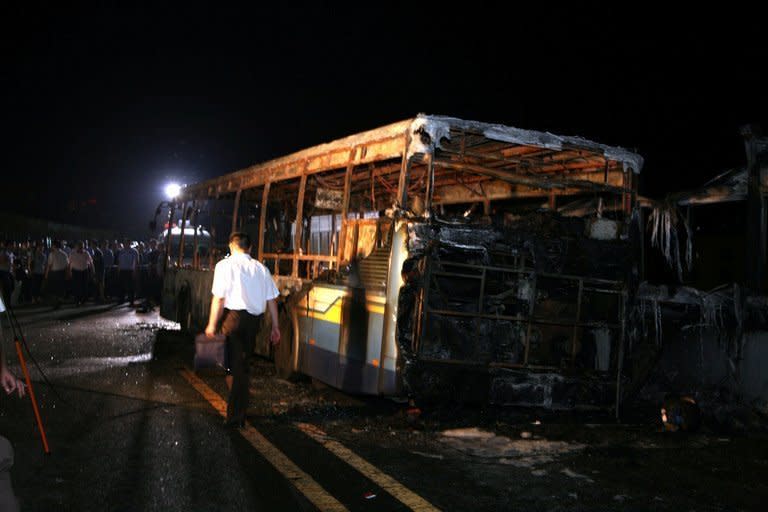Arsonist blamed for deadly China bus fire
An arsonist who wanted to "vent personal grievances" is suspected to have caused a horrific bus blaze in China which left 47 people dead, state media said Saturday. Police in Xiamen found notes at the house of a local man saying he planned the arson attack, which saw a bus being engulfed in flames within minutes during Friday's evening rush hour in the southeastern coastal city, Xinhua said. Chen Shuizong, who was born in 1954, planned the attack as he was "unhappy and pessimistic", the official state news agency said, quoting a statement from the local government. The statement also said DNA evidence found that Chen was the key suspect in the tragedy, one of China's deadliest individual acts of violence in recent years. Chen died in the inferno, the statement said. City officials had earlier told a news conference that a criminal probe had been launched after initial investigations showed the accelerant was petrol, while the bus was equipped with a diesel engine. The investigation by experts and police also showed that the tyres and tank of the bus "remained complete", Xinhua said. There have been previous reports of attacks on public transport in China, by people aiming to air personal grievances or settle scores with authorities. In 2009, a bus in China's southwestern city of Chengdu was set ablaze by an unemployed man with gasoline, killing 28 people and injuring more than 70. Online reports said there was heightened security at bus stops in Xiamen on Saturday. Xinhua said there were 90 passengers on the bus when it caught fire, five less than the vehicle's capacity. Thirty-four people were hospitalised following the blaze on the BRT (Bus Rapid Transit) vehicle. Witnesses said the bus was destroyed within 10 minutes by the fire, and some heard a series of explosions. Jiang Xiatong, who was sitting near the back window of the bus, told the state-run Global Times newspaper that she smelt a "peculiar odour" before the vehicle caught fire. "While I was climbing, I felt my legs being pressed by someone, and then I felt a hot wave burn my legs," she told the newspaper. Another survivor told domestic media that passengers were asking "Who brought petrol on the bus?" moments before it caught fire. The bus operated on a nine metre (30 foot) elevated road, in what was believed to be China's first overhead rapid transport system when it was launched in 2008. The network of three lines covers 67 kilometres (42 miles), and carries 265,000 people a day, with buses often crowded during rush hour. A total of 15 students were on board the bus, and seven of them are receiving medical treatment in hospital, Xinhua said. Eight students remain missing, according to the Xiamen Municipal Education Bureau. Xinhua also said that two candidates for the gaokao, China's national university entry examination, were among those being treated at hospital. The two-day exam began on Friday. "It was rush hour, the train was full and it was a total mess after the explosion," a student surnamed Lu told the local Fujian web portal fjsen.com. He also said his hair caught fire, but he escaped the blaze through the bus window. Scores of netizens took to the Internet to raise concerns immediately after the incident. The Xiamen fire comes after a crash involving two high-tech bullet trains in the eastern province of Zhejiang in 2011 sparked public debate that officials were overlooking safety in their rush to develop the country's vast transport network. More than 40 people died in that accident.




